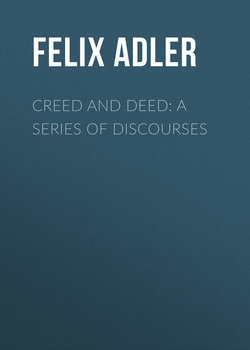Читать книгу Creed and Deed: A Series of Discourses - Felix Adler, Felix Adler - Страница 4
CREED AND DEED
III. THE NEW IDEAL
ОглавлениеThe old religions and science are at war. With pitiless consistency science directs its attack upon their vulnerable positions. The conception of inexorable law subverts the testimony of miracles; the fond belief in truths divinely revealed fails to withstand the searching analysis of historical criticism; the battle of science is yet far from being won, but from our standpoint the issue cannot appear doubtful. It behooves us therefore to inquire into the moral bearings of the general result thus far achieved and to review what we have lost and won. Shall we succeed thereby in allaying the sense of alarm that is wont to agitate the timid heart when it beholds so much that it confidently believed a part of the everlasting verities of life, sink back into the gulf of uncertainty and doubt?
We are standing at the portals of a new age, and new conceptions have arisen of the purpose which we are here to accomplish and of the means of help we can command in the attempt to realize our destiny. These new conceptions we call The New Ideal. It is the purpose of our present discourse to compare some salient features of the old and new.
The old and new Ideals agree in looking to an Infinite beyond the borders of experience, for it is in the nature of the ideal to lift us above the merely real. They differ in the direction in which they seek their object, and the bias which they consequently give to men's thoughts and actions. Theology, perceiving the inability of reason to solve the problems of the beginning and the end, yet unable to restrain a desire to know what is really unknowable, has impressed the imagination into its service, and drawn a picture of the transcendental world, conforming indeed to the analogies of man's terrestrial existence, but on this account all the more adapted to answer the wishes of the masses of mankind. Enough for them that they feel the need of believing the picture true. We of the New School are, if possible, even more profoundly convinced of the limitations of human reason. We cheerfully accord to the religious conceptions of the past a poetic value; they are poetry, often of the sublimest kind; but we cannot deceive ourselves as to the noble weakness of the heart to which they owe their origin; we cannot forget that in their case alas the wish has been father to the thought. To us the mystery is still mystery – the veiled arcana are not revealed, the riddle is unread. But we are not therefore filled with terror or dismay. In the moral nature of man we discover a divine element. In the voice of conscience we hear the voice of the present divinity within us, and we learn to regard this mortal state of ours as a channel through which the currents of Eternity ebb and flow ceaselessly. The divine nature is not far off, nor beyond the sea; in our own hearts on our own lips!
But let us seek to scrutinize the distinctive features of the old and new more closely. The old ideal was supernatural in character, it taught man to regard his life on earth as a brief, temporary transit, himself an exile from the Kingdom on high. The concerns of the present world were in consequence deemed of secondary importance, and the eye dwelt with anxious preference on the dim chances of the hereafter. Where the hope of immortality has been prominently put forward by any religion, the effect has thus but too often proved disastrous to the progress and security of society. It is well-known by what painful penances the monks of the Middle Ages sought release from the trammels of the flesh, how they affected to despise the ties of domestic affection, how they retarded the advancement of knowledge, how the passions which they sought in vain to suppress often recoiled upon them with fearful retribution, and gave rise to disorders which seriously undermined public virtue.
But not only has supernaturalism tended indirectly to weaken the springs of virtue, it has called into being an order of men whose very existence is a standing menace to the freedom of intellect and the rights of conscience. The distance between the Creator and his creatures is so great, that the intervention of some third party is deemed necessary to mediate between the finite and the Infinite. The priest steps in to perform this office, and his influence is great in proportion to the value of the services which he is supposed to render. Furthermore it is believed that the personal deity requires the performance of certain actions in his honor, and what these actions are is again left to the priest to determine. In this manner the ceremonial part of religion grows up, and acquires a degree of importance fatal to the moral life. The duties toward God transcend the duties toward man, and but too often usurp their place.
